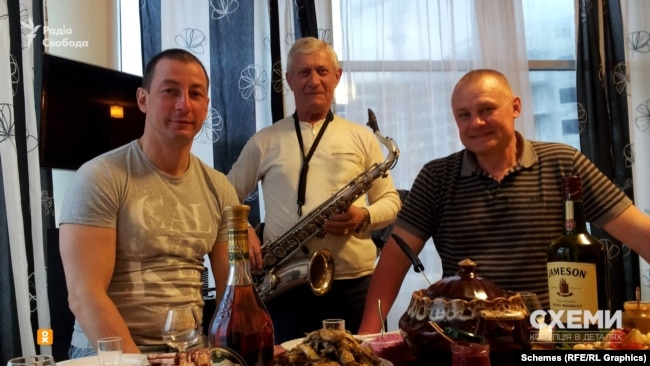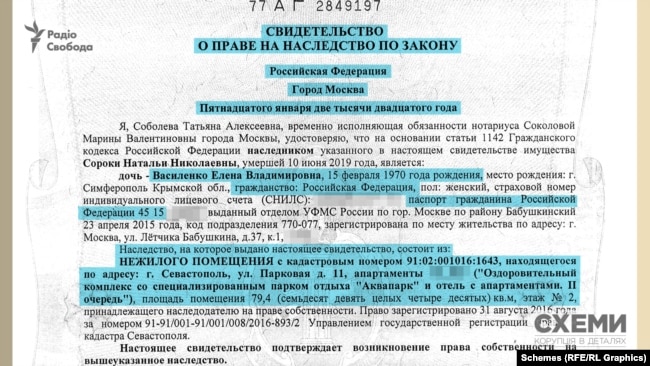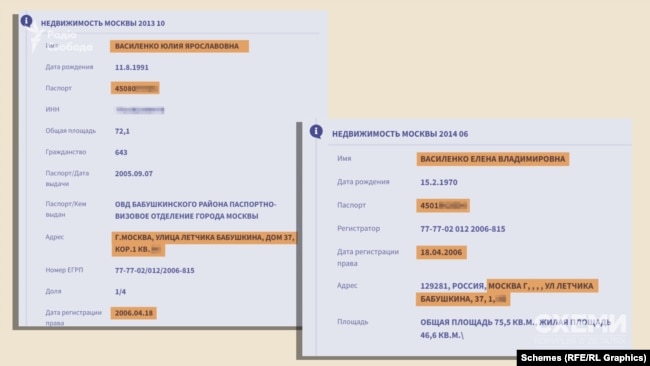
Judge Yaroslav Vasilenko traveled to Crimea 25 times
Judge of the Ukrainian Sixth Administrative Court of Appeal Yaroslav Vasilenko made 25 trips to Crimea and has undeclared apartments on the Black Sea coast in Sevastopol, registered to his wife, which she owns since 2020 on the passport of a citizen of the Russian Federation.
At the same time, in his declaration, the judge does not indicate either the spouse’s Crimean property or her Russian citizenship. In addition, the judge's family has real estate in Moscow, which is also not reflected in Vasilenko's property declaration. This is reported by the journalists of the program “Schemes” (a project of Radio Liberty).
Yaroslav Vasilenko did not comment on this information, although the editors tried to get his explanation.
Investigative journalists received data on the trips of Ukrainian judge Yaroslav Vasilenko from the Russian border crossing base, into which the Russian authorities began to enter data on all those entering the peninsula from mainland Ukraine. So the Schemes found out that since 2014, a representative of the Ukrainian judiciary traveled to Crimea several times a year, the last time in 2021.

Judge Yaroslav Vasilenko traveled to Crimea 25 times
According to Schemes, Judge Vasilenko made his first trip to the Crimean Peninsula after the annexation on July 2, 2014, crossing the administrative border through the Armyansk checkpoint. That same summer, Judge Vasilenko once again came to Crimea. The journalists managed to find photos of the judge from the trips of that period in social networks.

Judge Yaroslav Vasilenko traveled to Crimea 25 times
In 2015-2016, Judge Vasilenko traveled to Crimea 8 times in total Crimea, as evidenced by photos on the Odnoklassniki social network published by a relative of the judge.

Vasilenko continued to travel to Crimea and beyond, until July 2021. Journalists calculated that in total Judge Vasilenko spent at least 206 days on the peninsula.

Judge Yaroslav Vasilenko went to Crimea 25 times
“What is wrong with trips to Crimea? Firstly, from the moment of entering the peninsula, a person is already subject to Russian laws, shows documents to the occupying border guards, pays in the Russian ruble, and even pays taxes to the Russian budget, each time buying something. Secondly, the question arises why a representative of the Ukrainian authorities is not afraid of being detained?” Schemes’ investigation says. judges who traveled to Crimea.
“This is a judge, he has the power to make a decision in the name of Ukraine. And thus, he actually recognizes the jurisdiction of Russia in the Crimea. In addition, when a Ukrainian judge travels freely to Crimea, big questions arise: does such a judge receive security guarantees there? And we, as citizens of Ukraine, have no confidence that the judge was not forced to cooperate with the Russian authorities there,” says Galina Chizhik, an expert at the Anti-Corruption Action Center and coordinator of the Public Integrity Council in 2016-2018.
</blockquote
The Schemes also discovered that Judge Vasilenko does not declare the family's property in Crimea and Russia.
Thanks to photos of a judge from Crimea on social networks, journalists calculated the exact location and number of the apartment where Judge Vasilenko stayed. “Schemes” found out that they belong to his wife Elena Vasilenko and are registered to her as a citizen of the Russian Federation.
The property is located in the Aquamarine elite residential complex on the Black Sea coast in Sevastopol.
In total, Elena Vasilenko has two apartments in the residential complex “Aquamarine” with a sea view with a total area of 115 square meters. This is evidenced by the entries in the official Russian register of the transfer of ownership of real estate received by Schemes journalists.
Previously, these apartments were designed for the judge's mother-in-law Natalia Soroka. At the same time, as indicated in the certificate of the right to inheritance of the judge’s wife, according to which the registration of property rights took place and which the Schemes received at their disposal, the judge’s wife became the owner of the apartment on her passport of a citizen of the Russian Federation, about which the registrar in Moscow made the appropriate decision .
The journalists checked the details of her passport and found that it was valid. The judge's wife received a Russian passport in 2015 upon reaching the age of 45. Prior to that, she also had Russian citizenship. In the judge’s declarations, there is no mention of the wife’s Russian citizenship, although the corresponding column is provided for this.
In his property declaration for 2020, the judge of the Sixth Administrative Court of Appeal did not indicate that his wife owns apartments in Sevastopol.
Judging by the cost of apartments for sale in this complex, the estimated market price of the Crimean property of the Vasilenko family can reach more than 17 million hryvnia.
In addition, the Schemes established that the family of the judge of the Sixth Administrative Court of Appeal owns real estate in Moscow, on Pilot Babushkin Street. The owners of half of the apartment with a total area of 72 square meters are the wife of the judge Elena Vasilenko and daughter Yulia Vasilenko, as evidenced by an extract from the Russian register of rights to transfer ownership of real estate. At the same time, the wife and daughter of the judge registered the ownership of the apartment according to the passports of citizens of the Russian Federation.
Vasilenko's wife and daughter became the owners of this property in 2006, however, having become a judge, he never included information about him in the declaration.
According to specialized real estate websites where you can buy an apartment in this house, the cost of the share of the judge’s wife in this apartment is approximately UAH 2.5 million. Thus, the estimated value of the judge's property, which he did not include in the declaration, including apartments in Sevastopol, is about UAH 20 million.
“If this was done intentionally, then the subject of the declaration in this case may face either a fine… either community service from 150 to 240 hours, or a sanction in the form of restriction of freedom for a maximum of two years. An additional penalty may also be imposed in the form of deprivation of the right to hold certain positions or engage in certain activities for up to three years,” says Anton Marchuk, lawyer at the Anti-Corruption Center NGO.
The “schemes” went to one of the court hearings of judge Vasilenko, but he refused to answer journalists' questions about undeclared real estate in Crimea and Moscow, about regular visits to Crimea, and his wife's Russian citizenship, which was not reflected in the declaration. The journalists stated the same questions in a written request to the judge and will publish the answer as soon as it arrives.
Judge Yaroslav Vasilenko studied at the Red Banner Military Institute of the USSR Ministry of Defense in Moscow. After graduating in 1991, he worked in military courts in Ukraine, and in 2008 he took the position of a judge of the Kyiv Administrative Court of Appeal, later, in 2018, he became a judge of the Sixth Administrative Court of Appeal, where he still works.
In January 2014, at the height of the Maidan events, Vasilenko, who at that time held the position of a judge of the Kyiv Administrative Court of Appeal, considered an appeal against the decision of the Kyiv District Administrative Court to ban mass gatherings on the Maidan. Then the board of judges of the appellate instance agreed with the conclusions of the OASK that “the actions of the protesters impede the normal work of state authorities located in the epicenter or near the places of the actions” and confirmed the ban on holding any mass actions on the Maidan in the period from December 7, 2013 .to January 7, 2014
In 2016, the High Council of Justice of Ukraine, headed by Vasilenko's classmate Igor Benedisyuk, conducted an audit of the actions of Judge Vasilenko. Analyzing the decision of the board of appeal, the High Council of Justice recognized that “a ban on holding peaceful assemblies in the relevant territory for a long time is the most severe and disproportionate way of restriction. Thus, the judges committed violations of the rule of law when considering an administrative case.” At the same time, they refused to open disciplinary proceedings on these facts.
DOSSIER: Igor Benedisyuk: where is the pocket judge Poroshenko running? PART 1
Judge Benedisyuk was “ordered” by unknown, presumably offended colleagues













